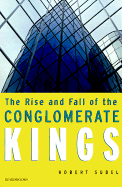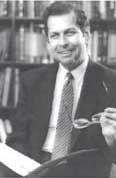|
|
|
|
||||||

|
The Rise and Fall of the Conglomerate Kings
By Robert Sobel 1999/01 - Beard Books 1893122476 -Paperback - Reprint - 248 pp. US$34.95 This fascinating book chronicles the rise of a cadre of imaginative, bold, and often ruthless entrepreneurs who took advantage of a buoyant stock market to create giant enterprises. Publisher Comments This is the behind-the-scenes story of the financial wizards and bare-knuckled businessmen who created the conglomerates, the glamorous multi-form companies that marked the high noon of post-World War II American capitalism. Covering the period from the end of the war to 1983, Robert Sobel explains why and how the conglomerate movement originated, how it mushroomed, and what caused its startling and rapid decline. From the back cover blurb: The Rise and Fall of the Conglomerate Kings is the behind-the-scenes story of the financial wizards and bare-knuckled businessmen who created the conglomerates, the glamorous multiform companies that marked the high noon of post-World War II American capitalism. Covering the period from the end of the war to 1983, Robert Sobel explains why and how the conglomerate movement originated, how it mushroomed, and what caused its startling and rapid decline. He chronicles how the era gave rise to a cadre of imaginative, bold, and often ruthless entrepreneurs who took advantage of a buoyant stock market to create giant enterprises, often through the exchange of overvalued paper for real assets. This authoritative and unprecedented books sheds light on the careers of the leading "conglomerateurs": Royal Little of Textron, Tex Thornton of Litton, James Ling of LTV, Charles Bluhdom of Gulf + Western and Harold Geneen of ITT. Review by David Henderson This book is the behind-the-scenes story of the financial wizards and bare-knuckled businessmen who created the conglomerates, the glamorous multi-form companies that marked the high noon of post-World War II American capitalism. Covering the period from the end of the war to 1983, the author explains why and how the conglomerate movement originated, how it mushroomed, and what caused its startling and rapid decline. Business historian Robert Sobel chronicles the rise and fall of the first Masters of the Universe in the U.S. and describes how the era gave rise to a cadre of imaginative, bold, and often ruthless entrepreneurs who took advantage of a buoyant stock market to create giant enterprises, often through the exchange of overvalued paper for real assets. He covers the likes of Royal Little (Textron), Text Thornton (Litton Industries), James Ling (Ling-Temco-Vought), Charles Bludhorn (Gulf & Western) and Harold Geneen (ITT). This is a good read to put the recent boom and bust in a better perspective. While these men had vastly different personalities and processes, they had a few things in common: ambition, the ability to seize opportunities that others were too risk-averse to take, willing bankers, and the expansive markets of the 1960s. There is something about an expansive market that attracts and creates Masters of the Universe. The Greek called it hubris. The author tells a good joke to illustrate the successes and failures of the period. It seems the young son of a Conglomerateur brings home a stray mongrel dog. His father asks, "How much do you think it's worth?" To which the boy replies, "At least $30,000." The father gently tries to explain the market for mongrel dogs, but the boy is undeterred and the next afternoon proudly announces that he has sold the dog for $50,000. The father is proudly flabbergasted, "You mean you found some fool with that much money who paid you for that dog?" "Not exactly," the son replies, "I traded it for two $25,000 cats." While it lasted, the conglomerate struggles were a great slugfest to watch: the heads of giant corporations battling each other for control of other corporations, and all of it free from the rubric of "synergy." Nobody could pretend there was any synergy between U.S. Steel and Marathon Oil. This was raw capitalist power at work, not a bunch of fluffy dot.commies pretending to defy market gravity. History repeats itself, endlessly, because so few people study history. The stagflation of the 1970s devalued the stock of conglomerates and made it useless a currency to keep the schemes afloat. The wave crashed and waiting on the horizon for the next big wave: the LBO Masters of the 1980s. From A.L. Dickes - Choice Sobel contends that the 'conglomerate movement' was actually characterized by diverse personalities who pursued diverse personal goals and objectives. . . . {He} suggests that the often advanced theoretical rationale for the formation of the conglomerate had little influence on the individuals involved. Rather, individual motivation (i.e., power, prestige, the thrill of the hunt) seemed to be a much more powerful force. . . . Sobel concludes, implicitly, that the 'conglomerate movement' was a movement only in that a number of individuals used similar financial devices and techniques to piece together industrial organizations. Sobel's work adds needed scholarly research and analysis to the subject of this relatively recent period of consolidation. Although his treatment is scholarly he writes with ease and provides a study suitable for both undergraduates and general readers. From Mark Hendrickson - The Christian Science Monitor (Eastern edition) {This} is a highly readable, meticulously researched history of the unusual, often idiosyncratic 'conglomerateurs' who have brought spectacular financial pyrotechnics to post-World War II Wall Street. This book is more entertaining than it is educational. . . . One of the chief virtues of this book is that the author evidently has no axes to grind against the individuals whose deeds he retells. Some of his subjects might not be pleased with the image that emerges of them in these pages, but the portraits seem to be firmly grounded on objective research. From Jules Koslow - The New York Times Book Review One of the book's virtues is that these people take on real substance. The late Charles Bluhdorn of Gulf and Western, who is described as 'the most devious and shady of all the conglomerators,' emerges as the most complex of the corporate raiders. But it is Harold Geneen, the former chairman of I.T.T., who is portrayed as the master. According to his detractors, he was, like many of the others, 'willing to bend the law to benefit his corporation.'. . . {Sobel} has relied heavily on material from the business press. Readers looking for the details of how these conglomerators achieved their goals will not go away unsatisfied. But 'The Rise and Fall of the Conglomerate Kings' can be appreciated by anyone who enjoys the derring-do of strong, willful personalities  Robert
Sobel was born in 1931 and died in 1999. He was a prolific historian of American business life, writing or editing more than 50 books and hundreds of articles and corporate profiles. He was a professor of business at Hofstra University for 43 years and held a Ph.D. from New York University. Besides producing books, articles, book reviews, scripts for television and audiotapes, he was a weekly columnist for Newsday from 1972 to 1988. At the time of his death he was a contributing editor to Barron's Magazine. Robert
Sobel was born in 1931 and died in 1999. He was a prolific historian of American business life, writing or editing more than 50 books and hundreds of articles and corporate profiles. He was a professor of business at Hofstra University for 43 years and held a Ph.D. from New York University. Besides producing books, articles, book reviews, scripts for television and audiotapes, he was a weekly columnist for Newsday from 1972 to 1988. At the time of his death he was a contributing editor to Barron's Magazine.
|
|
|
|
home
| about us
| contact us
| related
sites |